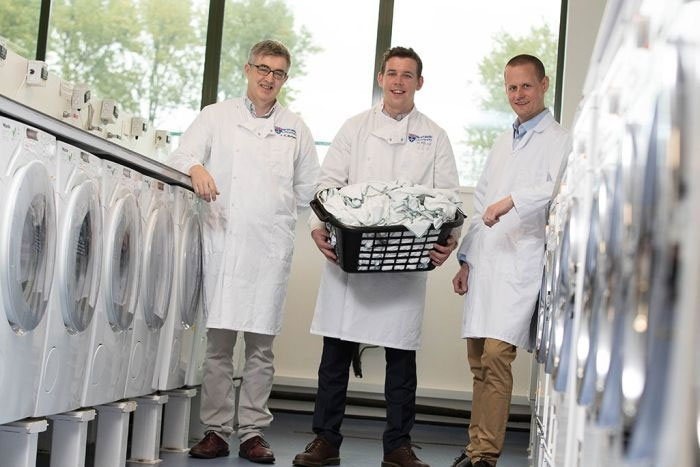Washing clothes with more water spreads more microscopic particles
Cleaning clothes in a water-intensive washing cycle frees up more plastic particles from clothes than any other cycle, new research by UK scientists shows.

In their research, Grant Burgess, Max Kelly and Neil Lant tested different amounts of water, spin speed, temperature and washing time.(Photo: Newcastle University).
After comparing the different washing cycles of a washing machine, researchers from the United Kingdom found that the main factor in removing microparticles from clothes was the amount of water, not the degree of stirring. Mixing of clothes by washing machine. The more water used, the more plastic particles are pulled out of the fabric.
Previous research has suggested that the speed of the drum, the number of times it changes the direction of rotation in a cycle and the pause time in the cycle - all known as machine stirring - is the most important factor in Micro plastic particles are released.
"But we have shown here that even if the level of mixing decreases, the dispersion of microfiber is still the largest with a higher water-to-cloth ratio ," said Max Kelly, a PhD student at the University. Newcastle, who led the study, said.

Selecting the Delicate washing mode helps protect clothes from damage but spreads many micro-particles that contaminate water sources.
"This is because of the large amount of water used in a delicate wash cycle, which protects sensitive clothes from damage, actually losing more fibers from the fabric."
The team used the Tergotometer washer, which is a device on the same surface of eight small washers and is often used to test the detergent.
They tested the difference in the amount of water, rotation speed, temperature, and time to calculate the amount of microfiber released.
To prove their theory, they then experimented with soft washing cycles by washing machines at test centers at Procter and Gamble, a large company that owns several brands of detergent and property. for Mr. Kelly's research.
Changes need to be made to wash clothes without harming the environment

Many microparticles are released when washing clothes from synthetic fabrics.
Mr Kelly recommends: "Fabrics for making clothes need to be more durable to help reduce the amount of fibers released during washing . " Research shows that after about 5 washing cycles, the amount of microfiber is no longer released from 100% of polyester clothes. But after 10 wash cycles, the synthetic cotton blend continued to spread a lot of microfiber.
Mr. Kelly also hopes this research will impact future washing machine design."Some washing machine manufacturers in the equipment industry have announced the development of washing machine filters that help capture these fibers," he said.
"However, doing this will take a long time, while we can all make small, daily changes immediately to help reduce our environmental impact."
Mr. Kelly advises the washing machine user to gather dirty laundry until you have a full load of laundry and then press the washing machine.
"This will prevent too much water from entering the washing machine, causing microfiber to be released from clothes. This will also help us save a lot of water and energy , " he said.
"People around the world will have different washing machines and cycles. The best way to wash will be a cycle where consumers fill up clothes and use smaller amounts of water."

Hang clothes that are less likely to spread particles into the air than drying clothes.
On the other hand, scientists also recommend drying clothes instead of drying. A study published in February found that using a clothes dryer caused many fibers to be released from clothes, namely that the drying cycle spreads 3.5 times more fabric than the washing cycle.
Instead of spreading microfiber into water, the study says using a dryer releases the fibers into the air.
- Detecting microplastics in rainwater, not only is it lying under the sea
- Discovered billions of microscopic particles in tea filter bags
- Clothes worn for weeks without washing
- 11 errors using washing machines in most families
- Manufacturing washing machines using polymer particles to clean clothes
- Warning: Washing machine may be the culprit causing infertility
- Technology helps wash clothes without washing powder or any bleach
- Wash clothes by sun exposure
- A warning for those who do not wash new clothes before wearing
- Washing machines do not need ... water and soap
- Microscopic movement of microscopic particles
- The unknown effects of nanotechnology
- Happy news: Washing dishes and washing clothes will help women live longer
- Clean up the clothes by the fish robot
 Is the magnetic North Pole shift dangerous to humanity?
Is the magnetic North Pole shift dangerous to humanity? Washington legalizes the recycling of human bodies into fertilizer
Washington legalizes the recycling of human bodies into fertilizer Lightning stone - the mysterious guest
Lightning stone - the mysterious guest Stunned by the mysterious sunset, strange appearance
Stunned by the mysterious sunset, strange appearance